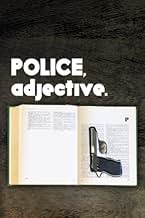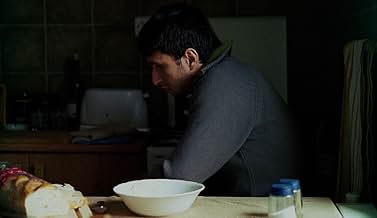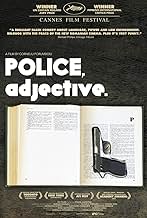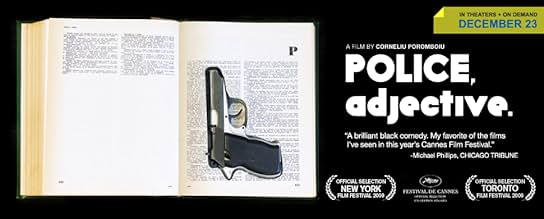AVALIAÇÃO DA IMDb
6,9/10
5,4 mil
SUA AVALIAÇÃO
Adicionar um enredo no seu idiomaA police officer refuses to arrest a young man for offering drugs to his friends.A police officer refuses to arrest a young man for offering drugs to his friends.A police officer refuses to arrest a young man for offering drugs to his friends.
- Prêmios
- 15 vitórias e 15 indicações no total
George Remes
- Vali
- (as Remes George)
Constantin Dita
- Officer on Duty
- (as Costi Dita)
Avaliações em destaque
One of the best movies of the year - and, definitely, of the Romanian cinema all over.
After "12:08: East of Bucharest" (aka "A fost sau n-a fost" - original title), Cornel Porumboiu does it again: an incisive and tender, empathic and ruthless look into our contemporary humanity. It brings back memories of Kafka's "Trial": the blind mechanism of Law, meant to help us live better and, because of so many machine-like people, turned into a device for destroying lives. In the role of the young policeman who loses his faith into the system, Dragos Bucur brings on screen another of his memorable performances - subtle, deep, finely tuned.
But the main virtue of this excellent movie, of course, is Cornel's directing - credible, original, precise. The static long shots, creating pent-up inner tensions... the unbearable waiting scenes, under a leaden sky... the discrete plastic compositions of the frame... the insidious rhythm... the careful attention to the minutest details - everything, with a due meaning and a perfectly weighted impact.
Special kudos for the pivotal scene built up around Mirabela Dauer's song "I Don't Leave You Love" - a rare piece of abstruse idiocy, used as a main axis for the protagonist's confrontation with the life's absolute absurdity. The scene is so masterfully built and shot, that it makes us scream laughing (in Cannes, the audience was delirious) - but the ultimate meaning is tragic... this being Porumboiu's definitory characteristic - as he said himself: "comical authors are often the saddest ones of all".
After "12:08: East of Bucharest" (aka "A fost sau n-a fost" - original title), Cornel Porumboiu does it again: an incisive and tender, empathic and ruthless look into our contemporary humanity. It brings back memories of Kafka's "Trial": the blind mechanism of Law, meant to help us live better and, because of so many machine-like people, turned into a device for destroying lives. In the role of the young policeman who loses his faith into the system, Dragos Bucur brings on screen another of his memorable performances - subtle, deep, finely tuned.
But the main virtue of this excellent movie, of course, is Cornel's directing - credible, original, precise. The static long shots, creating pent-up inner tensions... the unbearable waiting scenes, under a leaden sky... the discrete plastic compositions of the frame... the insidious rhythm... the careful attention to the minutest details - everything, with a due meaning and a perfectly weighted impact.
Special kudos for the pivotal scene built up around Mirabela Dauer's song "I Don't Leave You Love" - a rare piece of abstruse idiocy, used as a main axis for the protagonist's confrontation with the life's absolute absurdity. The scene is so masterfully built and shot, that it makes us scream laughing (in Cannes, the audience was delirious) - but the ultimate meaning is tragic... this being Porumboiu's definitory characteristic - as he said himself: "comical authors are often the saddest ones of all".
This is a film about a policeman and a matter of conscience. There's a circle of three friends, two boys and a girl, one boy has denounced the other boy to the police for supplying marijuana, it appears that this is so he can have the girl to himself. Our policeman, Cristi is being pressed to slap the cuffs on the kid by his superior, the charge is a life-wrecker, seven years in prison for smoking joints at lunch break. Cristi spends the movie trying to avoid this outcome. As he says, it's a foolish law.
Cristi is pushing against a bureaucracy that simply doesn't care, and ends up looking like a fool when he talks to people who are more educated with him, for example suffering his girlfriend's overanalysis of a ludicrous ballad, or the pseudo-dialectics of his boss, a masterpiece of sophistry. The point is that language or words often constitute another form of aggression, as the Athenians knew, you can win any argument once you have mastered rhetoric. Of course, as soon as anyone raises their voice or gets upset, this is taken as a sign that they've lost the argument, the intellectual warfare, losing having nothing whatsoever to do with being right or wrong of course.
The film is about conscience, something that totalitarian societies tried to eliminate in favour of the wisdom of the law. Good film although some of the intricacies of the discussions were lost on me not being a Romanian, and unable to follow the thread of Romanian spelling and grammar.
I actually loved the movie on an aesthetic level, I doubt it was intentional, but I always pick up on dashes of yellow in visual arts, an eccentricity of mine. For example in the street where the kid under surveillance lives, all the utilities pipes that come out onto the street are painted bright yellow, the young girl appears first wearing a bright yellow top under denim, and Cristi uses a yellow lighter and a yellow pen, most of the rest of the colour in the movie is very dull and subdued, I enjoyed these flashes. It's also nice seeing old communist offices, nowadays in the west everything is open plan and new, no-one has offices except the capo di tutti capi. Here there's peeling plaster, old caved in lockers, and a little peace and quiet. Hell I even liked just seeing Cristi sat down eating. Then there's the formal way where letters and plans are just shown on the screen with no background. I like the style of the police reports.
I would just point out that based on my understanding of the film, the English title is a mistranslation, politist is like the French word policier, which all we can translate as is "police procedural"; another translation is "policeman". The translations are nouns though so I was a little confused as to why it's being referred to as an adjective. Maybe the error is meaningful?
Cristi is pushing against a bureaucracy that simply doesn't care, and ends up looking like a fool when he talks to people who are more educated with him, for example suffering his girlfriend's overanalysis of a ludicrous ballad, or the pseudo-dialectics of his boss, a masterpiece of sophistry. The point is that language or words often constitute another form of aggression, as the Athenians knew, you can win any argument once you have mastered rhetoric. Of course, as soon as anyone raises their voice or gets upset, this is taken as a sign that they've lost the argument, the intellectual warfare, losing having nothing whatsoever to do with being right or wrong of course.
The film is about conscience, something that totalitarian societies tried to eliminate in favour of the wisdom of the law. Good film although some of the intricacies of the discussions were lost on me not being a Romanian, and unable to follow the thread of Romanian spelling and grammar.
I actually loved the movie on an aesthetic level, I doubt it was intentional, but I always pick up on dashes of yellow in visual arts, an eccentricity of mine. For example in the street where the kid under surveillance lives, all the utilities pipes that come out onto the street are painted bright yellow, the young girl appears first wearing a bright yellow top under denim, and Cristi uses a yellow lighter and a yellow pen, most of the rest of the colour in the movie is very dull and subdued, I enjoyed these flashes. It's also nice seeing old communist offices, nowadays in the west everything is open plan and new, no-one has offices except the capo di tutti capi. Here there's peeling plaster, old caved in lockers, and a little peace and quiet. Hell I even liked just seeing Cristi sat down eating. Then there's the formal way where letters and plans are just shown on the screen with no background. I like the style of the police reports.
I would just point out that based on my understanding of the film, the English title is a mistranslation, politist is like the French word policier, which all we can translate as is "police procedural"; another translation is "policeman". The translations are nouns though so I was a little confused as to why it's being referred to as an adjective. Maybe the error is meaningful?
The Romanian film wonder goes on and what's wonderous about it is that it's not afraid of life, like most movies around the world are. Since the beginning of the 1900s, there's an agreement about that life being absolutely boring. Lucky thing you can cut the film.
But here, we follow the young policeman on a routine mission, trying to investigate a supposed drug crime. The camera goes on for ten minutes, nothing happens or more likely...everything happens. What's morality about. Following the law or following your conscience? Or is it the same thing? Or should it be? An action drama there the action takes place inside the characters and the viewers. And that's absolutely fair enough.
But here, we follow the young policeman on a routine mission, trying to investigate a supposed drug crime. The camera goes on for ten minutes, nothing happens or more likely...everything happens. What's morality about. Following the law or following your conscience? Or is it the same thing? Or should it be? An action drama there the action takes place inside the characters and the viewers. And that's absolutely fair enough.
I recently saw "4 Months, 3 Weeks, 2 Days", about a woman's efforts to have an abortion in Nicolae Ceausescu's Romania. Now comes "Politist, adj." ("Police, Adjective" in English), Romania's submission to the Academy Awards as Best Foreign Language Film of 2009. This one looks at small-town cop Cristi (Dragos Bucur) assigned to investigate a boy smoking hashish, and how he begins to have misgivings about the ethical ramifications of the task.
What strikes me is how much this small town in Romania looks like Russia. Most of the buildings all have a very Eastern Bloc look. To be certain, there are a few scenes where Dragos goes to the boy's house in what appears to be a posher section of the town, with more modern-looking houses. Many of the scenes in the film are long shots, especially the scene where Cristi and his superior use the dictionary to debate the true meaning of conscience and other words.
I don't know if I would call this the greatest movie ever made, but I still recommend it. The scene where Cristi eats dinner while his wife has an obnoxious song playing on the computer really shows Cristi's break in terms of conscience, just because of how he reacts.
Anyway, I like to get to see cultures that we don't often see, and I really liked this movie. I hope that Romania gives us more like this.
What strikes me is how much this small town in Romania looks like Russia. Most of the buildings all have a very Eastern Bloc look. To be certain, there are a few scenes where Dragos goes to the boy's house in what appears to be a posher section of the town, with more modern-looking houses. Many of the scenes in the film are long shots, especially the scene where Cristi and his superior use the dictionary to debate the true meaning of conscience and other words.
I don't know if I would call this the greatest movie ever made, but I still recommend it. The scene where Cristi eats dinner while his wife has an obnoxious song playing on the computer really shows Cristi's break in terms of conscience, just because of how he reacts.
Anyway, I like to get to see cultures that we don't often see, and I really liked this movie. I hope that Romania gives us more like this.
In "Police, Adjective", Romanian director Corneliu Porumboiu devotes himself to the story of a small town cop reluctant of busting a minor for endorsing hashish with friends. Although vague at first, we learn that the civil police Cristi is having an unease conscience about nailing the young man, which may inflict seven years in prison for what Cristi believes to be a petty crime that will – soon enough – be looked upon more liberated. Throughout pic we follow his daily routines and interactions in the downbeat and austere town of Vaslui, including scenes of parodic bureaucracy and laudable lengthy takes.
"Police, Adjective" is admittedly in many ways difficult to interpret. The first half of the film deals with classic police work (classic as in reality, not classic as in previously depicted on film) including Cristi's pursuit of suspects and filing reports. For an audience used to clustered action flicks, this may seem as tedious and unbearable to endure. From a more objective perspective, I find it somewhat original and daring. This course of the film is harmless, it is on the contrary a certain, yet inevitable cul-de-sac initiated by a mere typo, that pushes it in a slightly too academic stand. On the other hand, it could also be considered an ironic twist when deciding how Cristi's moral dilemmas should be solved.
One of the more unfortunate aspects of Porumboiu's directing, in particular substantial for "Police, Adjective" but nonetheless equally visible in previous film "12:08 East of Bucharest", is that the (black) humor sometimes may appear so subtle that when juxtaposed to foreigners it can be completely lost (in translation.)
Watching Porumboiu's battle between an objective and supreme law versus Cristi's subjective conscientious law is evidently quite fascinating, despite being a bit too submissive at times.
"Police, Adjective" is admittedly in many ways difficult to interpret. The first half of the film deals with classic police work (classic as in reality, not classic as in previously depicted on film) including Cristi's pursuit of suspects and filing reports. For an audience used to clustered action flicks, this may seem as tedious and unbearable to endure. From a more objective perspective, I find it somewhat original and daring. This course of the film is harmless, it is on the contrary a certain, yet inevitable cul-de-sac initiated by a mere typo, that pushes it in a slightly too academic stand. On the other hand, it could also be considered an ironic twist when deciding how Cristi's moral dilemmas should be solved.
One of the more unfortunate aspects of Porumboiu's directing, in particular substantial for "Police, Adjective" but nonetheless equally visible in previous film "12:08 East of Bucharest", is that the (black) humor sometimes may appear so subtle that when juxtaposed to foreigners it can be completely lost (in translation.)
Watching Porumboiu's battle between an objective and supreme law versus Cristi's subjective conscientious law is evidently quite fascinating, despite being a bit too submissive at times.
Você sabia?
- CuriosidadesRomania's official submission to 82nd Academy Award's Foreign Language in 2010.
- Trilhas sonorasNu te parasesc iubire
Performed by Mirabela Dauer
Arranged by Dan Dimitriu
Lyrics by Dan Ioan Pantoiu
Produced by Roton Music
Played and discussed at Cristi's home
Principais escolhas
Faça login para avaliar e ver a lista de recomendações personalizadas
- How long is Police, Adjective?Fornecido pela Alexa
Detalhes
- Data de lançamento
- País de origem
- Central de atendimento oficial
- Idioma
- Também conhecido como
- Police, Adjective
- Locações de filme
- Empresas de produção
- Consulte mais créditos da empresa na IMDbPro
Bilheteria
- Orçamento
- € 800.000 (estimativa)
- Faturamento bruto nos EUA e Canadá
- US$ 53.206
- Fim de semana de estreia nos EUA e Canadá
- US$ 19.452
- 27 de dez. de 2009
- Faturamento bruto mundial
- US$ 162.974
- Tempo de duração1 hora 55 minutos
- Cor
- Mixagem de som
- Proporção
- 1.85 : 1
Contribua para esta página
Sugerir uma alteração ou adicionar conteúdo ausente

Principal brecha
By what name was Polícia, Adjetivo (2009) officially released in India in English?
Responda


























